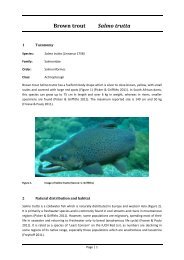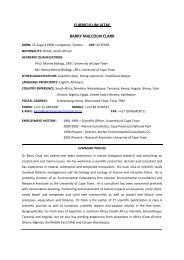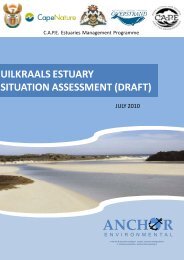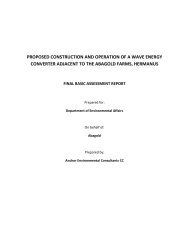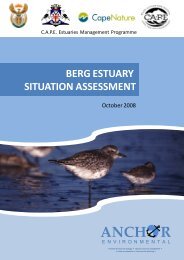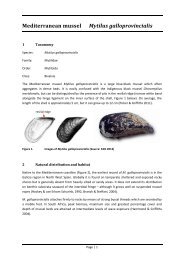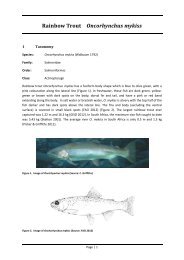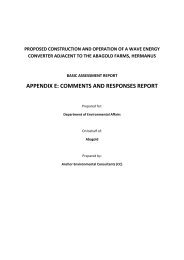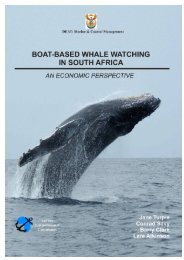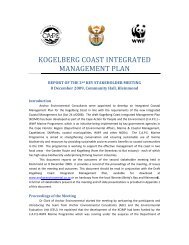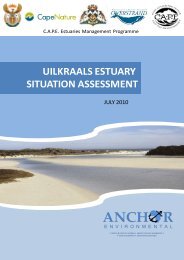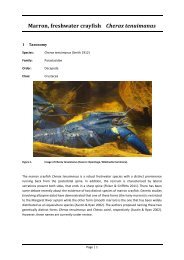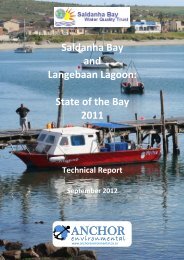Download PDF - Anchor Environmental
Download PDF - Anchor Environmental
Download PDF - Anchor Environmental
Create successful ePaper yourself
Turn your PDF publications into a flip-book with our unique Google optimized e-Paper software.
the production process) in all resident producing units, during some accounting period, usually<br />
a year. See 'national income'.<br />
Gross fixed capital formation (GFCF) - the total value of a producer's acquisitions, less disposals,<br />
of fixed assets during the accounting period, usually a year. Conventionally excludes natural<br />
assets which are not man-made and/or owned.<br />
Gross income - 'Gross revenue', 'turnover', usually a private measure.<br />
Gross national product (GNP) - the same as GNP except that it includes income earned abroad by<br />
nationals, and excludes income transferred abroad by foreign owners. See 'national income'.<br />
Gross national income (GNI) - the measure of the income earned, whether domestically or abroad,<br />
by factors of production owned by residents. See 'national income'.<br />
Gross operating surplus - that part of 'value added' that is not payments for labour or taxes on<br />
production.<br />
Gross output - 'gross revenue' in economic terms, commonly the aggregate of all gross revenues in<br />
the economy.<br />
Gross revenue – in general terms, equal to the unit price multiplied by the quantity of units sold by a<br />
production unit. Here used as a private value.<br />
Imports - goods or services consumed in one country which have been brought from another country.<br />
Indirect use value – the benefits derived from the goods and services provided by an ecosystem that<br />
are used indirectly by an economic agent. For example, an agent at some distance from an<br />
ecosystem may derive benefits from drinking water that has been purified as it passed through<br />
the ecosystem.<br />
Multiplier - the amount by which equilibrium output of the economy changes when aggregate<br />
demand – as caused for example by the expenditure by a development project – increases by<br />
one unit. As those receiving the initial round of income generated are likely to consume a<br />
portion of the additional income, this subsequent expenditure will lead to additional ripple<br />
effects of rounds of income and consumption throughout the economy. The net effect of these<br />
increases in output is the multiplier effect of the initial expenditure, measured as a proportion of<br />
the initial expenditure. Multipliers can be measured with respect to income, value added,<br />
imports, production, etc.<br />
National accounts – the compilation of accounts to derive estimates of the 'national income'.<br />
National income - the total net earnings of labour and property employed in the production of goods<br />
and services in a nation during some accounting period, usually a year. Commonly measured<br />
by the 'gross domestic product' (GDP) the 'gross national product' (GNP), and the 'gross<br />
national income' (GNI). Measured either as the value of all expenditure on final goods and<br />
services, the value of all payments to factors of production, or the value of all value added by<br />
producing units.<br />
Natural asset value – capital value of the stock of a natural resource. This is the present value of the<br />
stream of future 'economic rents' ('resource rents') that a natural resource will generate.<br />
Present values are typically obtained by 'discounting' future benefits and costs.<br />
Natural resource accounts - the compilation of asset and 'flow accounts' for natural assets, to<br />
complement the 'national accounts'. Asset accounts are valued in terms of 'natural asset value',<br />
flow accounts are valued in terms of 'national income'.<br />
Net income - 'profit', a private value.<br />
Net national income - 'Gross national income' less depreciation of assets.<br />
Net present value – the present value of an investment, found by 'discounting' all current and future<br />
streams of income or expenditure by a 'discount rate'.<br />
Non-use value – see ‘existence value’<br />
Open access resource – a good or service over which no property rights are recognised.<br />
Opportunity cost – the benefits foregone by undertaking one activity instead of another.<br />
Option value – the value of preserving the option to use services in the future.<br />
Precautionary approach - according to the Rio Declaration on Environment and Development<br />
(1992) where there are threats of serious or irreversible damage, lack of full scientific certainty<br />
shall not be used as a reason for postponing cost-effective measures to prevent environmental<br />
degradation.<br />
Private costs and benefits – costs and benefits directly felt by individual economic agents or groups<br />
as seen from their perspective. Costs and benefits are valued at the prices actually paid or<br />
received by the group, even if those prices are highly distorted. Sometimes termed ‘financial’<br />
costs and benefits.<br />
Production unit - an entity engaged in a productive activity, here describing an enterprise, commonly<br />
a household or a firm.<br />
90



